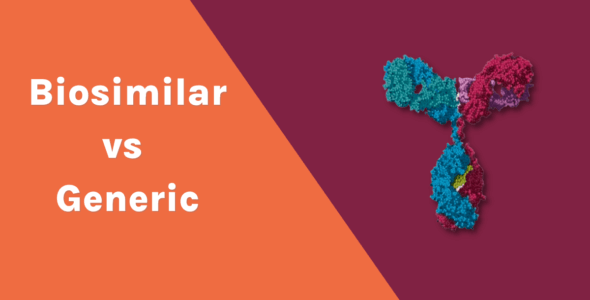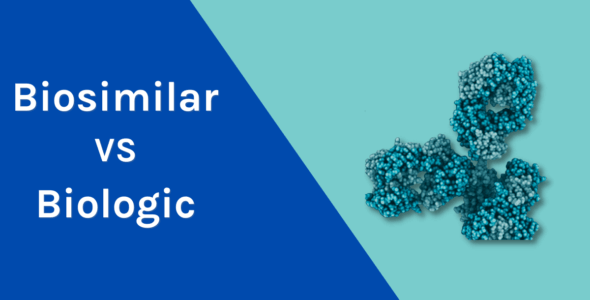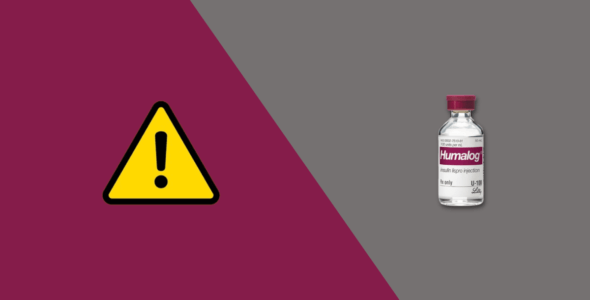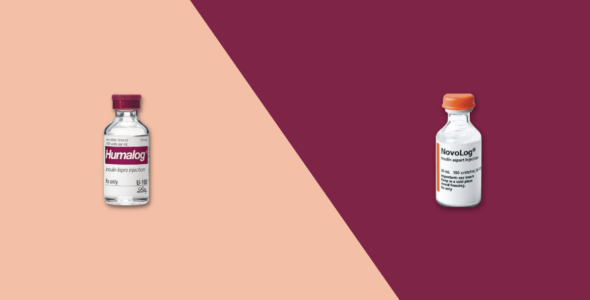Admelog and Humalog are brand names for prescription drugs used as insulin therapy for glycemic control in patients with diabetes. Both contain the same active ingredient, insulin lispro, and both are short-acting insulins. Here we will explain how they work, their similarities and differences, their side effects, and more. This should provide you with the basics to better understand your options.
What is Admelog?
Admelog (insulin lispro injection) is an FDA (U.S. Food and Drug Administration) approved medication manufactured by Sanofi-Aventis U.S. Admelog contains insulin lispro, a biosimilar rapid-acting insulin analog used to help control blood sugar levels in adults and pediatric patients 3 years of age and older with type 1 diabetes mellitus and adults with type 2 diabetes mellitus.
Admelog is a follow-on biologic drug of Humalog meaning Admelog is very similar to Humalog. Admelog is proven to lower A1C similar to Humalog, one of the most prescribed brands of mealtime insulin.
Admelog dosage
Admelog is available in injection form, in the following doses: 100 units/mL available as 10 mL multiple-dose vials, or 3 mL single patient-use Admelog SoloStar pens.
Unlike long-acting insulin you take once a day, Admelog is a fast-acting mealtime insulin taken to help manage blood sugar spikes that happen after you eat.
- Administer by subcutaneous injection within 15 minutes before a meal or immediately after a meal
- Administer Admelog by continuous subcutaneous infusion using an insulin pump
- Administer by intravenous infusion only after dilution and under medical supervision
The amount of insulin and the most effective time for you to use your insulin may change if you take a different type of insulin. The dosage must be based on the route of administration and your metabolic needs, blood glucose monitoring results, and glycemic control goal. Carry out changes of dose under close medical supervision and increase the frequency of blood glucose monitoring. Hypoglycemia may occur which may be life-threatening. Monitor blood glucose and increase the monitoring frequency with changes to insulin dosage, use of glucose-lowering medications, meal pattern changes, physical activity, renal or hepatic impairment, and in patients who are unaware of hypoglycemia. Hypoglycemia due to medication errors and accidental mix-ups between insulin products can occur.
Store the vial in a refrigerator until the expiration date on the pen or vial, or at room temperature, and use it within 28 days. Read the full instructions for use and always speak with a healthcare professional for medical advice or about any changes to your dose so they can monitor and evaluate your condition.
What is Humalog?
Humalog is an FDA-approved medication manufactured by Eli Lilly. It is a type of insulin used to treat type 1 and type 2 diabetes. Humalog is fast-acting insulin. You inject it under your skin or use it with an insulin pump just after you’ve eaten, to lower your blood sugar.
The active ingredient in Humalog is a type of insulin called insulin lispro. It’s similar to normal human insulin, and works in the same way, but has been modified to be faster acting. When you inject or pump Humalog into your body, it enters your blood supply. It then increases the rate at which your liver, and your fat and muscle cells, absorb sugar from your blood.
Humalog dosage
Humalog is available as 10 mL vials, 3 mL prefilled pens, 3 mL Humalog KwikPen prefilled Pens ,or 3 mL cartridges.
Humalog may be administered as a subcutaneous injection, continuous subcutaneous infusion pump, or intravenously. Your dose will be based on your condition and the method of administration.
Read the full instructions for use and always speak with a healthcare professional for medical advice or about any changes to your dose so they can monitor and evaluate your condition.
Common side effects of Admelog and Humalog
The most common side effects of Admelog include:
- Hypoglycemia (low blood glucose levels)
- Allergic reactions
- Injection site reactions
- Lipodystrophy
- Pruritus, and rash
- Weight gain
- Peripheral edema
More serious side effects of Admelog include:
- Hyperglycemia (high blood sugar) or hypoglycemia with changes in insulin regimen
- Hypersensitivity reactions
- Hypokalemia – monitor potassium levels
- Fluid retention and heart failure with concomitant use of thiazolidinediones (TZDs)
- Hyperglycemia and ketoacidosis due to insulin pump device malfunction
The most common side effects of Humalog in clinical trials include:
- Injection site reactions
- Lipodystrophy
- Weight gain
- Edema
- Pruritus
- Rash
More serious side effects of Humalog include
- Hypoglycemia (low blood sugar) – increase how often blood glucose is monitored when there are changes to insulin dosage, other glucose-lowering drugs, changes in meal pattern, or physical activity in those patients with renal or hepatic impairment, and in patients with hypoglycemia unawareness. According to the American Diabetes Association symptoms of low blood sugar levels include anxiety, behavior similar to being drunk, blurred vision, cold sweats, confusion, depression, lightheadedness, drowsiness, hunger, fast heartbeat, headache, irritability, restless sleep, and tingling in the hands, feet, lips, or tongue
- Severe life-threatening hypersensitivity reactions
- Hypokalemia (low potassium levels)
- Fluid retention and heart failure when used with thiazolidinediones
These aren’t all the side effects Admelog or Humalog can cause. You can find more details in the patient leaflet that comes with your medication. Talk to your physician or pharmacist if you have any concerns about side effects.
Admelog and Humalog drug interactions
Certain drugs may affect the metabolism of glucose, requiring insulin dose adjustment and close monitoring of blood glucose. These include:
- Angiotensin II receptor-blocking agents
- Monoamine oxidase inhibitors
- Atypical antipsychotics
- Corticosteroids
- Estrogens
- Beta-blockers
Humalog can interact with other medications. These include:
- Antidiabetic agents
- ACE inhibitors
- Angiotensin II receptor-blocking agents
- Monoamine oxidase inhibitors
- Atypical antipsychotics
- Corticosteroids
- Estrogens
- Beta-blockers
Admelog and Humalog can interact with other medications. This can change how Admelog and Humalog and other medications work and can make side effects more likely. Tell your prescribing physician about all your drugs, including vitamins and dietary supplements.
Admelog and Humalog contraindications
You should not use Admelog if you:
- Are allergic to the active ingredient insulin lispro
- Are allergic to any of the other ingredients in Admelog
- Are having episodes of hypoglycemia
Talk to your doctor before using Admelog if you:
- Are taking any of the medications that could interact with Admelog
- Are under 3 years of age with type 1 diabetes mellitus or are a child with type 2 diabetes mellitus
- Are pregnant or are planning to become pregnant
- Are breastfeeding or are planning to breastfeed
You should not use Humalog if you:
- Are allergic to the active ingredient insulin lispro
- Are allergic to any of the other ingredients found in Humalog (listed in the leaflet which comes with the medication)
- Think hypoglycemia is starting (a fall in blood sugar to low levels)
Talk to your doctor before using Humalog if you:
- Often have hypoglycemia or have problems recognizing it’s happening
- Have problems with your kidneys or liver
- Have recently become ill
- Are exercising more than usual
- Are planning to travel or go on vacation (time differences can change when you eat and when you take your Humalog)
- Have heart failure or other heart problems
- Are breastfeeding or plan to breastfeed
Other drugs for the treatment of diabetes
If you have any concerns about Admelog or Humalog side effects, talk to your physician, or pharmacist for medical advice. Also inform your healthcare provider about any medical conditions, supplements, and over-the-counter meds you are taking. You are also encouraged to report side effects to the FDA: visit http://www.fda.gov/medwatch or call 1-800-FDA-1088.



